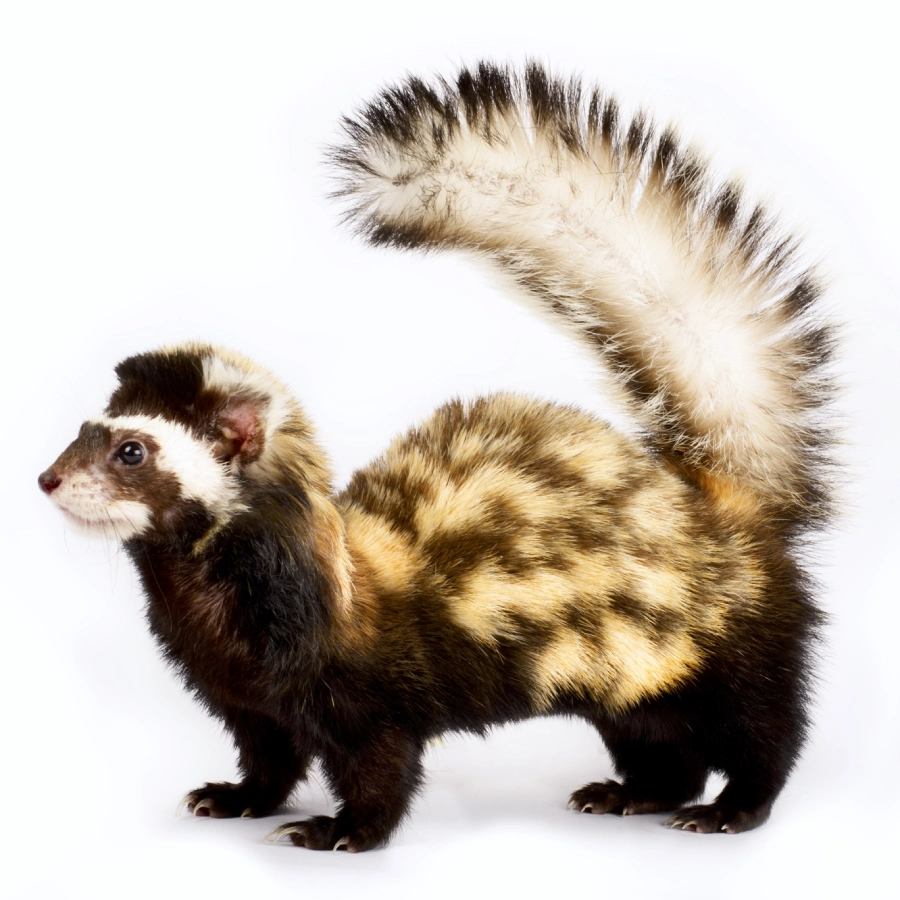
Striped skunks are stocky creatures with short legs, long claws, and fluffy tails. They have small heads, pointed snouts, and bright black eyes. The Striped Skunk’s most distinctive feature is – you guessed it – its stripes. White stripes run along a Striped Skunk’s back, right to the tip of its tail.
Spotted Skunks are similar to Striped Skunks; only their markings are more spotted or streaked. They’re more agile than their striped counterparts and are able to climb into chimneys and attics. Their spray is also even more pungent and can last for up to four months. Spotted Skunks don’t typically live in Manitoba, but their northernmost range is close to Canada’s border, so it doesn’t hurt to know a little bit about them just in case.
Like bears, skunks are flat-footed and this makes their tracks relatively easy to identify. Each print has five toes with claw marks, which look like dots in front of the toe pads. The heel pad is large and rectangular, especially on the rear tracks. In total, each skunk track measures approximately 3.5-4 cm long and 3-3.5 cm wide. You can often find skunk tracks in fresh mud or soil they have dug up, but rarely in the snow since skunks spend most of the winter inside their dens.
Skunks are highly adaptable animals, and their natural habitats include grasslands, woodlands, farm fields, and forests. They live in underground burrows and prefer to occupy the old dens of other animals rather than dig their own (though they are proficient diggers in a pinch).
Despite being shy, skunks are also adaptable to urban environments. They often den under porches, decks, or sheds by digging approximately 30 cm down.
Skunks are primarily nocturnal, so don’t be surprised if you have rarely (or never) seen the skunk you suspect is living on your property.
Skunk dens are approximately 30 cm deep and have a cone-shaped entrance.
Skunks are opportunistic omnivores – which means they basically eat anything and everything. In nature, they forage for insects, small animals, plants, eggs, and worms. In the city, they’re attracted to gardens, garbage bins, compost piles, and the grubs found in urban lawns.
Skunks mate in the early spring and give birth to litters of two to six kits. Young skunks wean after a couple of months and have a lifespan of about three years.
If you have skunks on your property, they are likely attracted by a convenient den site (under your porch, deck, or shed) or by accessible food sources like a garden, compost bin, insect-rich lawn, or unsecured garbage bins.
Though you may not often see skunks, they can do damage to your property by foraging and digging up your lawn. They can even do damage to the foundation of your home. Skunks are known to be carriers of rabies and other diseases. And, of course, there’s their spray – which can reek for days and be very difficult to counteract.
The best way to prevent skunks is to keep a clean and tidy property and keep a close lookout for early signs of a skunk in residence – tracks, conical holes, and burrowed areas in your lawn or garden.
Baby skunks develop the ability to spray just a few weeks after they are born. However, they rarely leave the den until they are weaned, so smelly encounters with very young skunks are very rare.
No. Striped Skunks are not built for climbing, so your chimney and attic are safe from them.
Skunks may be adorable, but their smell is not. They live all across Manitoba and are as well adapted to city life as they are to living in nature. If you suspect one (or more) of these unwanted pests has taken up residence on your property, it’s time to call in a professional pest control specialist. Gilles Lambert Pest Control Services Inc. can help!


